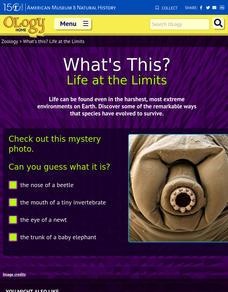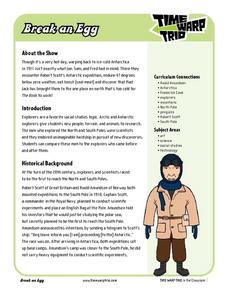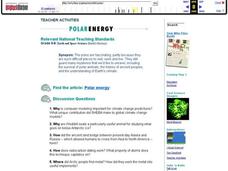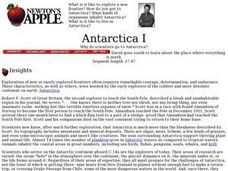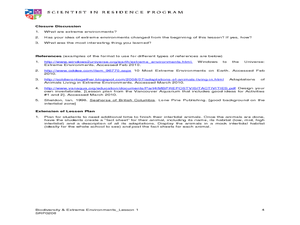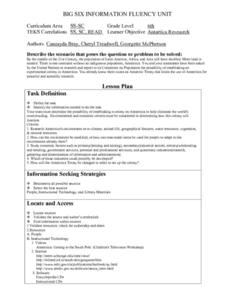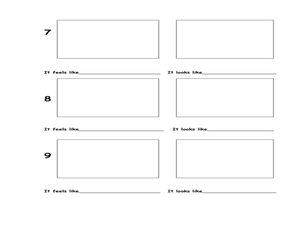Sea World
Arctic Animals
Discover the coldest animals in the world with a lesson about the Arctic habitat. Kids use a glossary and information sheet about animals found in the Arctic Circle to complete several activities, including tracking the lemming...
Curated OER
Arctic/Antarctic Animals
Fourth graders explore animals of the Arctic and Antarctic and then create a report. They become aware of the great diversity among animals.
Curated OER
Colossal Squid Caught in Antarctic
Students define the word colossal, then read a news article about an enormous squid caught off Antarctica. In this animal studies and current events lesson, the teacher introduces the article with dictionary and vocabulary activities,...
Curated OER
Arctic vs. Antarctic
Students describe the properties of the Arctic and the Antarctic. They write a report citing the similarities and differences of the two regions. They make a Venn diagram showing what they know about each.
Curated OER
Frozen Seas
Students research animal life in the frozen seas. In this researched based lesson, students use the Internet to create a poster about an animal that lives in an Arctic or Antarctic environment. Students will focus on the behavioral and...
Curated OER
Artic/Antarctic Animals
Fourth graders create an organized report which includes specific information about their assigned animal. They use the Alpha Smarts program and Microsoft Word to create their reports.
American Museum of Natural History
Race to the South Pole
Antarctica was the last continent humans explored. Explore how two teams raced to be the first using an interactive online lesson. Users learn about the climate challenges and how the teams sought to overcome them. The resource is...
American Museum of Natural History
What's the Big Deal About Water?
It may seem simple, but water is one of the most unique substances on Earth. An interactive online lesson describes its properties and importance in so many different situations. Learners interact with the lesson to learn the role water...
American Museum of Natural History
What's This? Life at the Limits
There are some amazing ways species evolve to survive. From large ears to sneezing salt, learners read about these interesting adaptations in an interactive lesson. Great to supplement an in-class lesson, it also works well as a remote...
Curated OER
Flightless Birds and Scientific Research
Students study the work done by various scientists on Antarctica. In this biology lesson, students play the role of researchers who must justify the importance of their study. They create a multimedia presentation about a specific issue...
Curated OER
Travel to the Polar Lands
Second graders receive an "Expedition Ticket" to travel through the Polar Regions- the Arctic and the Antarctic. They research polar bears and make drawings that are to scale.
Curated OER
Heading South
Students look at the migration of different birds. In this migration instructional activity, students discuss why an animal migrates and problems that can occur during migration. They look at several downloadable maps that show the...
Curated OER
Blubber Gloves
The ways that animals adapt to their environments is quite remarkable. In this life science lesson plan, fifth graders take a look at some of the ways that aquatic animals that live in Arctic or Antarctic waters survive. They perform an...
Curated OER
Climatic Zones
Third graders recognize and locate Frigid, Temperate, and Torrid climatic zones on the word map or globe. They explain that plants, animals, and human societies display adaptations to the climates they live in .
Curated OER
Blue Planet: Frozen Seas
Students study the animals from the Arctic and how they have adapted. In this ocean lesson students create a poster about their given animal and present it to the class.
Curated OER
Break an Egg
Students research antarctic wildlife and create a diorama and fact sheet to present their research to the class. They create an Antarctic explorer's journal.
Curated OER
Polar Energy
Students define and read an article on polar energy. In this polar energy instructional activity, students answer questions about the article. Students participate in activities related to isotopes, half-life and radiocarbon. Students...
Curated OER
Antarctica I
Students explore exploring and expiditions then simlate their own on campus. They divide into small "expedition groups." Have each team report back to the class about their expeditions, using written, oral, or videotaped presentations.
Curated OER
Extreme Environments
Students examine extreme environments and the characteristics that make them. In this adaptation lesson students see how animals have adapted to these environments.
Lubbock Independent School District
Antarctica Research
Sixth graders determine the possibility of establishing a colony on Antarctica to help eliminate the world's overcrowding. They consider environmental and economic criteria in determining how this colony functions ans is expected to do...
Curated OER
Penguin Parents are Cool
Fourth graders explore the lives of penguins and the relationship between them and their parents. They compare and contrast penguin populations in various areas of the world as well as their nesting sites. After constructing a penguin...
Curated OER
Exploring Marine Objects
Students identify the sources of water on Earth. In this life science lesson, students list the different plants and animals that live in the ocean. They explore marine objects in the lab and draw them.










